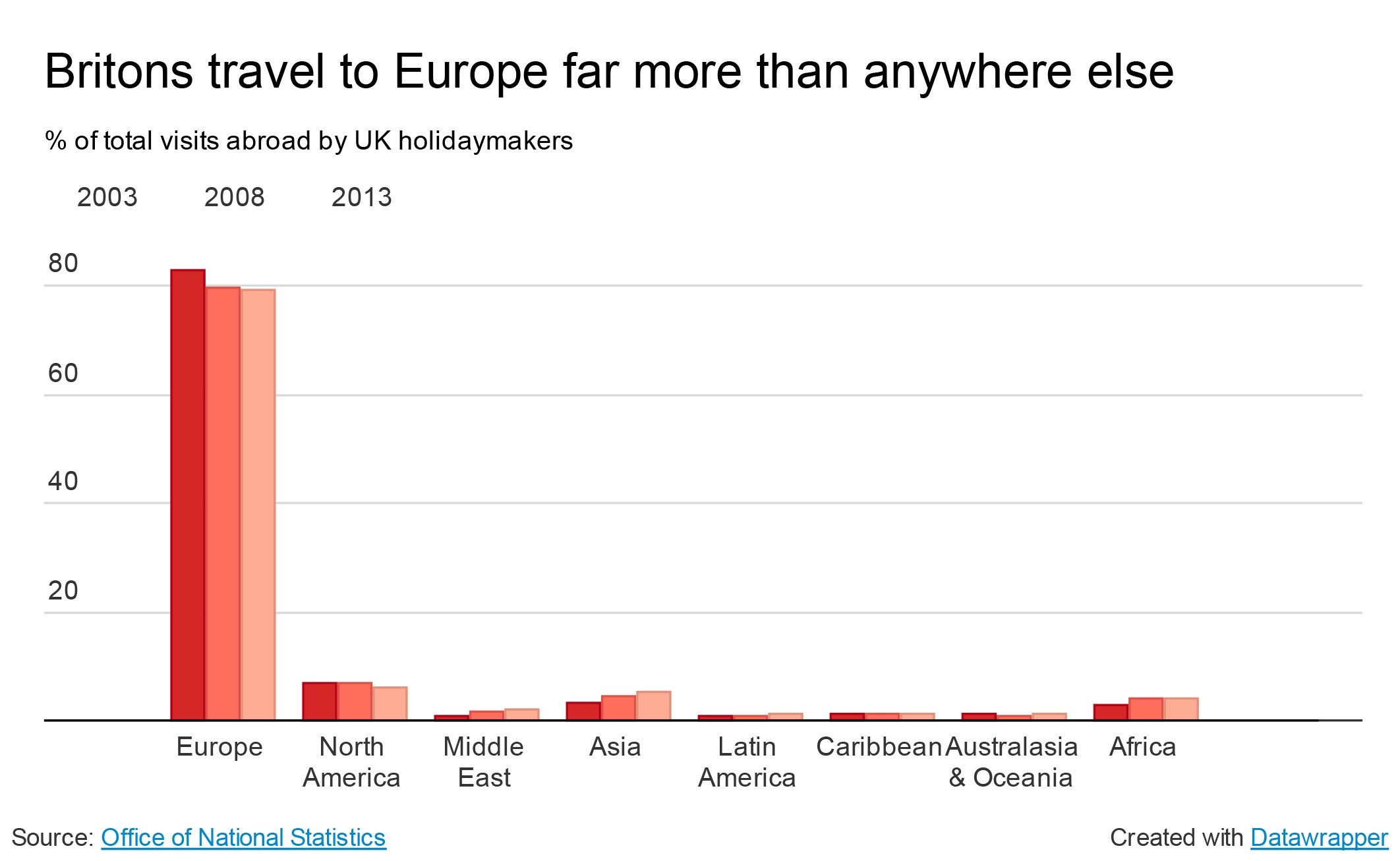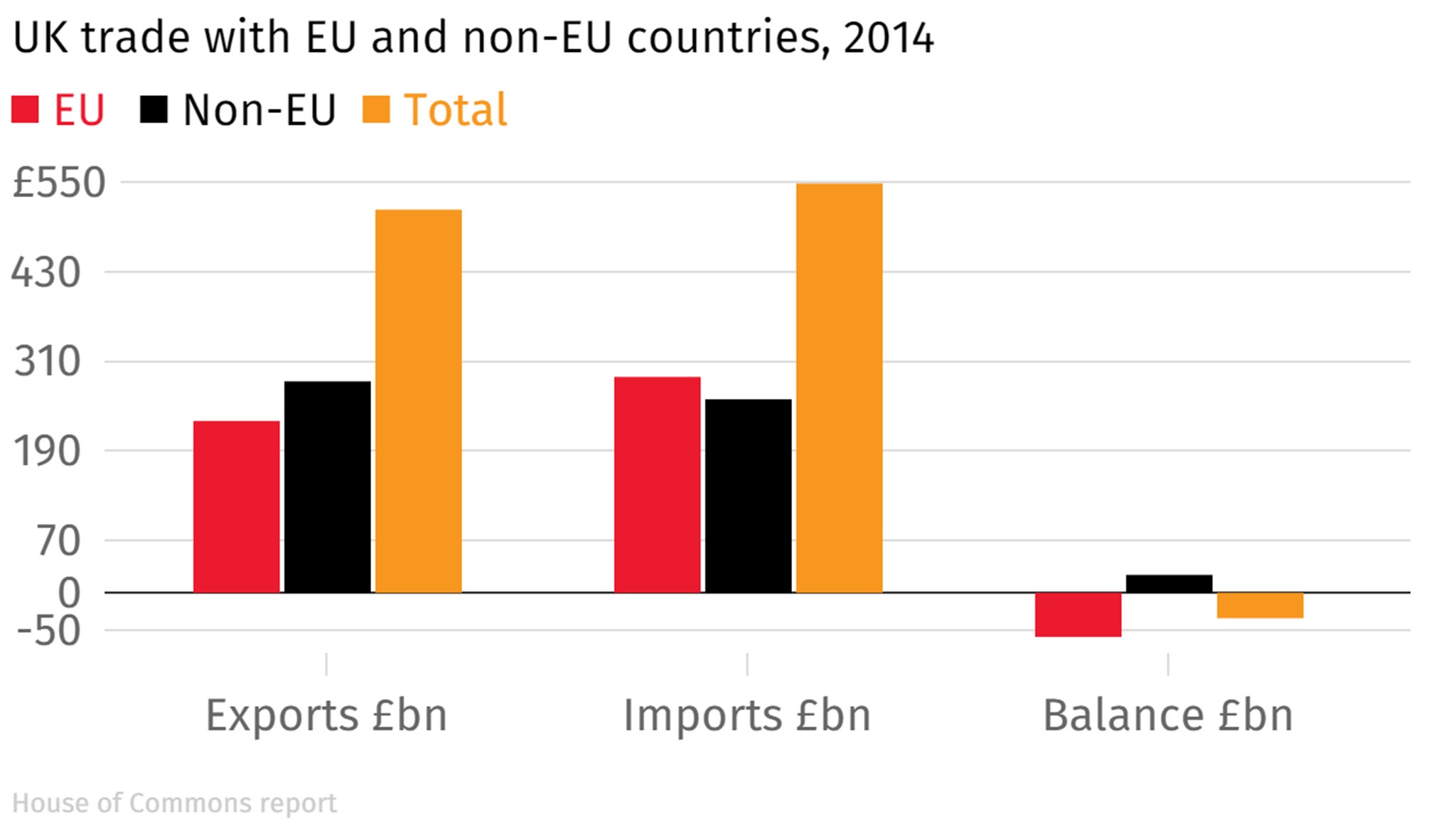What has the European Union ever done for us?
Brussels is responsible for more than just regulations governing the curvature of bananas

Your support helps us to tell the story
From reproductive rights to climate change to Big Tech, The Independent is on the ground when the story is developing. Whether it's investigating the financials of Elon Musk's pro-Trump PAC or producing our latest documentary, 'The A Word', which shines a light on the American women fighting for reproductive rights, we know how important it is to parse out the facts from the messaging.
At such a critical moment in US history, we need reporters on the ground. Your donation allows us to keep sending journalists to speak to both sides of the story.
The Independent is trusted by Americans across the entire political spectrum. And unlike many other quality news outlets, we choose not to lock Americans out of our reporting and analysis with paywalls. We believe quality journalism should be available to everyone, paid for by those who can afford it.
Your support makes all the difference.Britain's turbulent relationship with the European Union is coming to an end, after the UK opted for Brexit in the EU referendum.
David Cameron is resigning after failing to convince the public - and his own MPs - that he gained significant ground in his attempts to renegotiate the terms of Britain’s EU membership.
But although the UK and EU have had their ups and downs, there are a number of things the Union has done which some may feel could be worth holding on to.
1) It gives you freedom to live, work and retire anywhere in Europe

As a member of the EU, UK citizens benefit from freedom of movement across the continent. Considered one of the so-called four pillars of the European Union, this freedom allows all EU citizens to live, work and travel in other member states.
A British person to has the right to stay in any other EU country providing they have a valid UK passport.
The only requirement is that they register in the host country, have enough money to sustain themselves and have comprehensive health insurance.
Should a British citizen remain in another EU country for five years or more they are no longer required to meet any conditions and can only be exported in exceptional circumstances.
Another little-known benefit to EU membership is that UK nationals can retire anywhere in Europe and still receive their UK pension, providing they are registered there.
In fact, if a UK citizen has lived or worked in any EU country they can apply for their pension entitlement in accordance to their insurance record and social security contributions, they just have to inform the country where they last worked or lived, and their working history and all pension entitlements will be arranged.
2) It sustains millions of jobs
A report by the Centre for Economics and Business Research, released in October 2015, suggested 3.1 million British jobs were linked to the UK’s exports to the EU.
Should the UK remain member, that figure is forecast to rise by as much as 790,000 by 2030.
In addition, many large manufacturers argue that the UK currently benefits from being a part of the EU’s single market and it’s free trade agreements, suggesting they directly sustain millions of British jobs.
The EU also provides considerable subsidies to British farmers, helping to bolster agriculture and ensure job stability for the 476,000 directly involved in farming, and those working in sectors related to the industry.
3) Your holiday is much easier - and safer

Freedom to travel is one of the most exercised benefits of EU membership, with Britons having made 31 million visits to the EU in 2014 alone. But a lot of the benefits of being an EU citizen are either taken for granted or go unnoticed.
For example, when visiting other European countries British citizens have the right to receive emergency healthcare.
The EU also blacklists ‘dangerous airlines’, while its air passenger rights ensure that Europeans receive assistance and information if stranded. Compensation may be awarded should a person be denied boarding or if a flight is cancelled.
British people travelling outside the EU are also entitled to consular protection from any EU embassy in the absence of a UK embassy.
4) It means you're less likely to get ripped off
Consumer protection is a key benefit of the EU’s single market, and ensures members of the British public receive equal consumer rights when shopping anywhere in Europe.
The EU’s consumer rights ensure transparency from sellers themselves, and the quality and safety of their products.
A two-year guarantee on all products, and the introduction of a ceiling for roaming charges across member states, are just two examples of things the EU has done to improve the rights of its customers.
5) It offers greater protection from terrorists, paedophiles, people traffickers and cyber-crime

Another example of a lesser-known advantage of EU membership is the benefit of cross-country coordination and cooperation in the fight against crime.
Last month, former director of public prosecutions Sir Keir Starmer told The Independent: “We rely very heavily on the EU criminal justice measures and when I say very heavily, I mean 24/7.
"I’m talking here about terrorism, people trafficking, cyber-crime, sexual exploitation, trafficking of children and paedophilia: they all go across the borders into Europe.”
The ability for member states to share information and coordinate responses, sometimes simultaneously in several countries, is vital to the UK’s security.
6) Our businesses depend on it

According to 71% of all members of the Confederation of British Influence (CBI), and 67 per cent of small and medium-sized enterprises (SMEs), the EU has had an overall positive impact on their business.
The CBI estimates that the net benefit of EU membership is worth 4-5% of GDP to the UK, or £62bn-£78bn per year.
In 2014, the ONS reported that the EU, which is the world’s biggest economy, accounted for 44.6 per cent of all UK exports of goods and services, and 53.2 per cent of the UK’s imports of goods and services.
Meanwhile, the Centre for Economics and Business Research (CEBR) shows the overall contribution to our economy from exports to the EU was £187 billion last year, and that it could rise by almost half again to £277 billion a year by 2030.
It also claims access to European energy, transport and digital service markets, combined with new global trade deals, could add £58 billion to the UK economy every year by 2030, the equivalent to £1,000 per British citizen.
7) We have greater influence
Robin Niblett, Director of think-tank Chatham House, stated in a report published last year: “For a mid-sized country like the UK, which will never again be economically dominant either globally or regionally, and whose diplomatic and military resources are declining in relative terms, being a major player in a strong regional institution can offer a critical lever for international influence.
"In the UK’s case, this means committing to be a leading member of the world’s principal civilian power, the European Union.”
“The largest, proudest European nation cannot hope to shape globalisation – or even retain marginal relevance - by itself. It is only together that we have the weight to influence the big picture.”
Indeed, former European Commission President Jose Manuel Barroso argued in 2014: “The largest, proudest European nation cannot hope to shape globalisation – or even retain marginal relevance - by itself. It is only together that we have the weight to influence the big picture.”
Even US President Barack Obama briefly alluded to the importance of the UK’s role in Europe in an interview with the BBC last year, in which he stated: “[Having the UK in the European Union] gives us much greater confidence about the strength of the transatlantic union and is part of the cornerstone of institutions built after [the] second world war that has made the world safer and more prosperous.”
Join our commenting forum
Join thought-provoking conversations, follow other Independent readers and see their replies
Comments